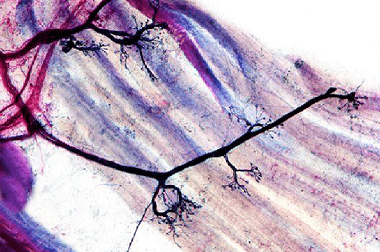Neurological diseases >>>> Benign fasciculations
Benign fasciculations.

Fasciculations - muscle twitching, in which there is a contraction of a group of muscle fibers of one bundle under the action of motor neurons. Fasciculations (muscle contractions) can be seen with the naked eye.
In a relaxed state, no bioelectrical activity occurs in the muscles, but there are a number of pathological conditions that can cause uncontrolled contractions of muscle fibers: multiple sclerosis, amyotrophic sclerosis, compression of roots and peripheral nerves, peripheral neuropathies, neuromyotonia, side effects of certain drugs, action of toxins in insect or snake bites, violations of the vitamin and mineral balance, neuroses, thyroid diseases, the consequences of muscle contracture.

Muscle fibrillation - contraction, twitching of one muscle fiber. During fibrillation, the entire muscle bundle or muscle does not contract. Fibrillation is not visible to the naked eye, and it can be detected, in addition to the sensation of unpleasant intramuscular twitching, using electromyography. Fibrillations can occur as a result of trauma or degenerative disorders of the axon or body of a motor neuron (motor neuron), as well as a result of myopathies or neurogenic disorders.
In order to determine the exact cause of fasciculations and fibrillations, it is necessary to undergo laboratory and hardware examinations of the state of muscle tissue and the work of motor neurons, to study the body's needs for vitamins and mineral components, to identify or exclude neurogenic disorders.
There is a term "benign fasciculations", which describes cases of spontaneously occurring muscle twitching. Benign fasciculations can occur with muscular overexertion (sudden excessive physical exertion: sports activities, lifting weights or applying other excessive muscular efforts), with nervous tensions as a result of stress, overwork, in states of increased anxiety, with hypothermia... Benign fasciculations usually occur during muscle relaxation: in sleep, before bedtime, in the morning, at rest. With active movements, such fasciculations disappear, but reappear during the next state of rest. Benign fasciculations are not accompanied by muscle weakness, loss of sensation and atrophic events in the muscle tissue. The above-described fasciculations have no clinical significance (hence the name of fasciculations - "benign") and pass on their own after a certain time (in some cases, the time intervals may be lengthened due to prolonged stress, overstrain of the nervous system).

Read

Read



























